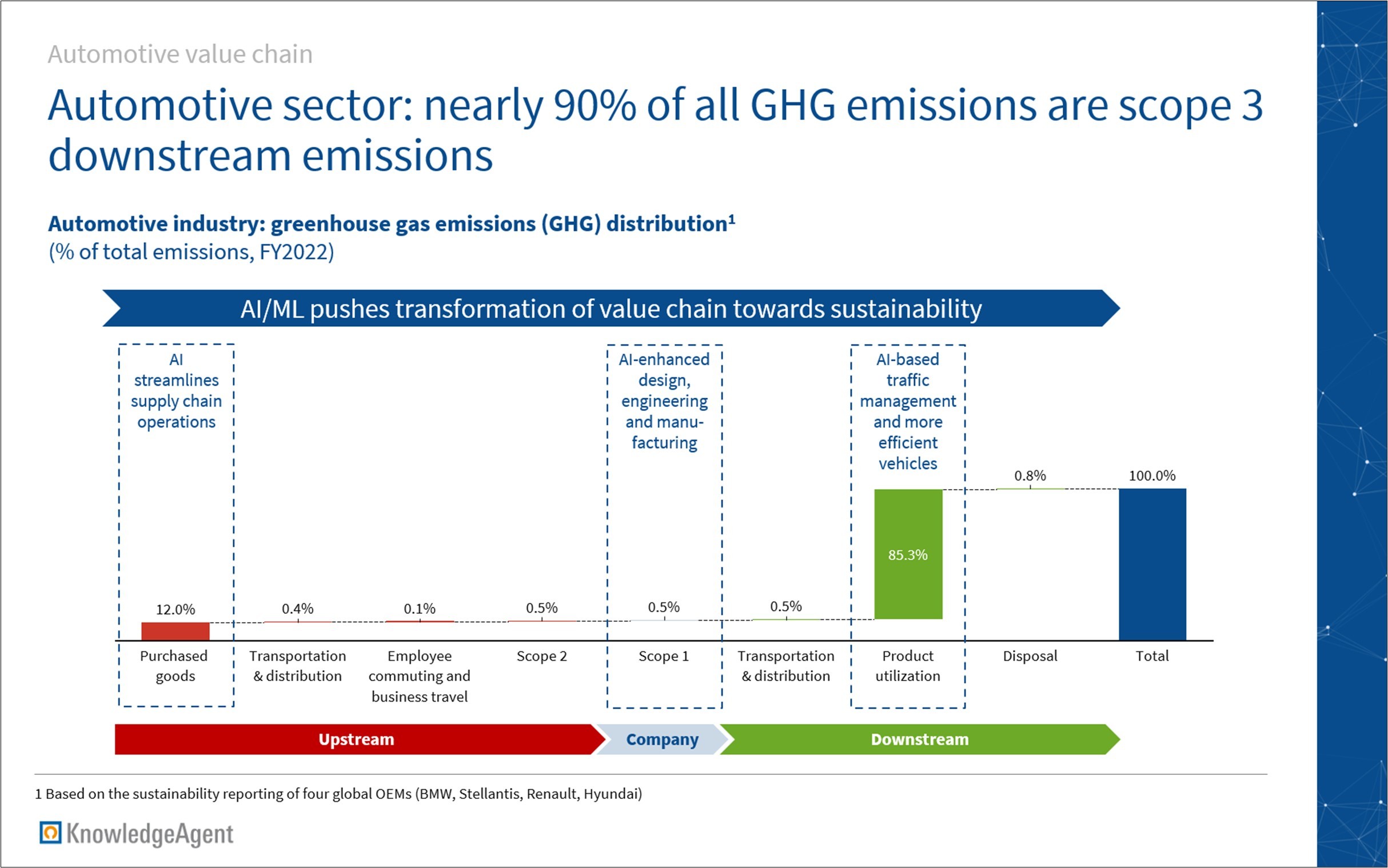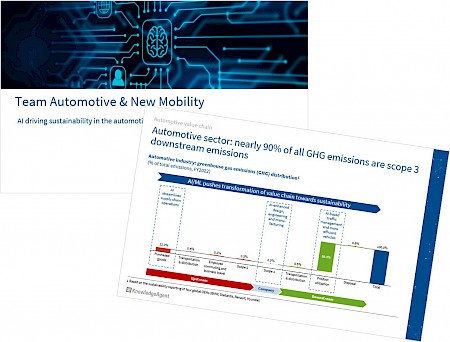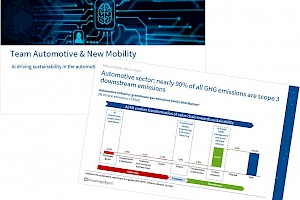In recent years, the automotive industry has embarked on a transformative journey towards greater sustainability, fueled by its adoption of Artificial Intelligence (AI) and Machine Learning (ML). With the sector’s commitment to reduce greenhouse gas emissions along the three scopes defined by the GHG Protocol, the integration of AI and ML is revolutionizing the automotive sector across the entire value chain, from sustainable supply chains, through resource efficient manufacturing, to more efficient vehicles.
Sustainable supply chains
Positioned at the beginning of the automotive value chain, sustainable supply chains are crucial for reducing the industry's scope 3 emissions. AI-powered analytics and data-driven insights enable manufacturers to make environmentally conscious decisions when sourcing materials and components. By identifying suppliers with eco-friendly practices and reducing transportation inefficiencies, AI streamlines supply chain operations, leading to lower emissions and a reduced ecological footprint.
The Austrian start-up Prewave plays a significant role here, scanning publicly available media sources and social networks across more than 150 countries and in more than 50 languages to assess the sustainability of direct and indirect suppliers. Embracing this AI-powered approach, the Volkswagen Group, along with its Porsche, Audi, and Volkswagen brands, has set up an early warning system to evaluate supplier sustainability based on criteria like environmental pollution, human rights issues, and corruption. Additionally, rival car manufacturer BMW collaborates with Prewave leveraging its platform to identify supplier-related sustainability risks and create transparency across its vast network of over 10,000 suppliers.
AI-enhanced design and engineering
AI's capabilities are also revolutionizing the next step in the value chain, vehicle design and engineering practices which belong to scope 1. Through sophisticated algorithms, AI optimizes vehicle aerodynamics, identifies lightweight yet durable materials, and improves overall energy efficiency, leading to vehicles that are built to achieve better fuel economy without sacrificing performance or safety.
General Motors stands out as a pioneer, utilizing AI-based algorithms to develop lightweight vehicle components. For instance, an optimized seat bracket resulting from this approach was 40% lighter and 20% stronger than its predecessor.
Sustainable manufacturing with AI
Transitioning from design to production, AI-driven manufacturing processes have emerged as a game-changer in minimizing the automotive industry's scope 1 emissions. Predictive maintenance systems powered by AI continuously monitor production equipment, anticipating potential failures and optimizing maintenance schedules. By ensuring machinery operates at peak efficiency, energy consumption is reduced, and unnecessary waste is minimized, leading to fewer resources spent and fewer emissions generated.
Both BMW and Volkswagen have implemented AI-powered predictive maintenance initiatives in their manufacturing facilities. BMW's real-time monitoring of body shop robots in the cloud enables better maintenance planning, significantly reducing equipment downtime, and saving precious time, energy, and resources. Meanwhile, Volkswagen uses ML and digital twins to enhance the energy efficiency of air compressors in their manufacturing plants which may have an annual savings potential of 800,000 euros in Wolfsburg alone.

AI-based traffic management
AI plays a pivotal role in shaping the future of mobility, promoting eco-friendly and efficient transportation solutions. Smart traffic management systems analyze real-time data to optimize traffic flow, effectively reducing congestion and scope 3 emissions.
In collaboration with city authorities, Israel-based NoTraffic has started to deploy AI-powered traffic management systems in several cities across North America. A study in British Columbia, Canada, demonstrated a 40% reduction in pedestrian delays, while a U.S. city deployment resulted in a 40% decrease in vehicle delays. Overall, NoTraffic claims its platform reduces traffic delay time by approximately 2,700 hours annually, leading to a substantial decrease of 33 tons of CO2 emissions per intersection and improved air quality for residents.
More efficient and sustainable vehicles
As the world rapidly shifts towards sustainable transportation, AI plays a crucial role in advancing electric mobility. Through sophisticated ML algorithms, EV manufacturers enhance battery performance, prolong battery life, and optimize charging infrastructure. Additionally, AI-enabled driver assistance features promote safer and more fuel-efficient driving habits, benefiting both the environment (by reducing scope 3 emissions) and road safety.
Tesla not only kickstarted the electric vehicle market but continues to revolutionize the automotive landscape with its AI-optimized vehicle technology. Tesla’s Autopilot system uses AI algorithms to enhance the vehicles’ driver assistance technologies and optimize energy consumption. For example, AI algorithms analyze real-time data from various sensors and systems including speed, route, terrain, weather, and driver behavior to predict energy requirements and adapt battery management, leading to increased battery life, lower energy consumption and, thereby, extended driving range.
AI’s sustainable impact on automotive innovation
With AI at the forefront of innovation, the automotive industry is making remarkable strides in enhancing sustainability throughout its operations. By incorporating AI-driven technologies into supply chains, vehicle design, manufacturing, and smart mobility solutions, automotive OEMs and other industry participants are reducing the environmental impact of automobiles and paving the way for a greener future. As AI technology continues to evolve, we can expect even more transformative solutions that will accelerate the industry's sustainability agenda, shaping a more environmentally responsible and energy-efficient landscape for generations to come.
If you are interested in discovering how other players in the automotive industry are leveraging AI to further their sustainability agenda or enhance manufacturing efficiencies, don’t hesitate to get in touch with our Automotive & New Mobility team.
Sources
-
Audi, 17/06/2021, Supply chain monitoring: Audi uses artificial intelligence (AI) for sustainability, https://www.audi-mediacenter.com/en/press-releases/supply-chain-monitoringaudi-uses-artificial-intelligence-ai-for-sustainability-14037, accessed 25/07/2023
-
Porsche, 03/03/2021, Porsche, Audi and Volkswagen use Artificial Intelligence to minimise sustainability risks, https://newsroom.porsche.com/en/2021/sustainability/porsche-audi-volkswagen-pilot-project-artificial-intelligence-minimisation-sustainability-risks-supply-chain-23801.html, accessed 25/07/2023
-
Prewave, 26/04/2022, Prewave Supports BMW Group with Supply Chain Act Compliance, https://www.prewave.com/news/prewave_and_bmw/, accessed 25/07/2023
-
Autodesk, 01/08/2018, Driving a Lighter, More Efficient Future of Automotive-Part Design at GM, https://www.autodesk.com/customer-stories/general-motors-generative-design, accessed 25/07/2023
-
Autocar Professional, 28/02/2020, BMW’s Munich plant increasing AI use to enhance efficiency, https://www.autocarpro.in/news-international/bmws-munich-plant-increasing-ai-use-to-enhance-efficiency-55708, accessed 25/07/2023
-
BMW, 15/07/2019, Fast, efficient, reliable: Artificial intelligence in BMW Group Production, https://www.press.bmwgroup.com/global/article/detail/T0298650EN/fast-efficient-reliable:-artificial-intelligence-in-bmw-group-production?language=en, accessed 25/07/2023
-
Tagesspiegel, Jana Kugoth, 05/04/2023, Künstliche Intelligenz bei VW
-
NoTraffic, 31/10/2019, NoTraffic, No Problems: AI Startup Improves Intersections, https://notraffic.tech/notraffic-no-problems-ai-improves-intersections/, accessed 25/07/2023
-
VentureBeat, Carl Franzen, 27/06/2023, Can AI help reduce traffic jams? NoTraffic raises $50M to outfit roads with smart sensors, https://venturebeat.com/ai/can-ai-help-reduce-traffic-jams-notraffic-raises-50m-to-outfit-roads-with-smart-sensors/, accessed 25/07/2023
-
Greater Phoenix Economic Council, 17/08/2020, Smart traffic lights improve driving experience, https://www.gpec.org/news/smart-traffic-lights-improve-driving-experience/, accessed 25/07/2023
-
LinkedIn Pulse, Alexander S., 10/04/2023, Revolutionizing Sustainability: How AI-Powered Energy Efficiency Transforms Industries and Fuels Green Growth , https://www.linkedin.com/pulse/revolutionizing-sustainability-how-ai-powered-energy-fuels-salehi/, accessed 25/07/2023
-
LinkedIn Pulse, Majid Salehi, 19/04/2023, Tesla's Use of AI: A Revolutionary Approach to Car Technology, https://www.linkedin.com/pulse/teslas-use-ai-revolutionary-approach-car-technology-alexander-stahl/, accessed 25/07/2023



